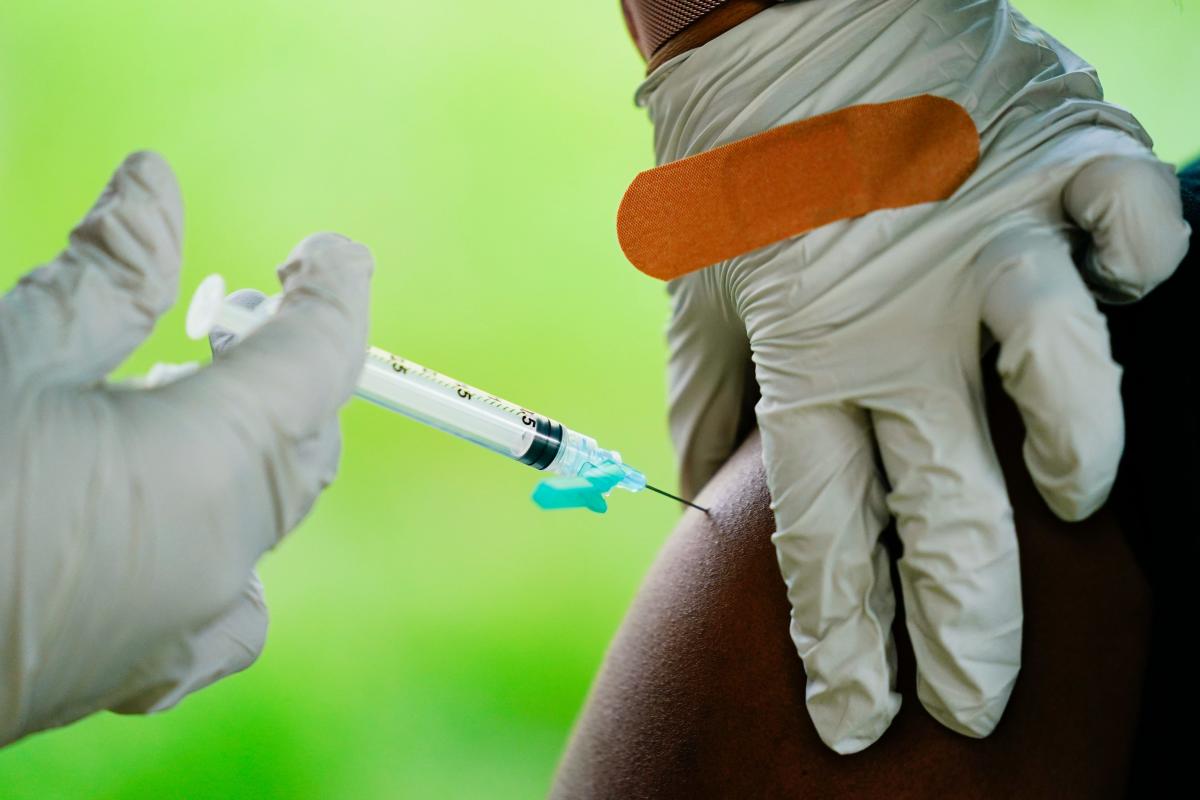The claim: Posts imply miscarriages and stillbirths drastically increased in 2021 due to COVID-19 vaccines
A March 23 Instagram post (direct link, archived link) features a graph showing an apparent spike in miscarriages and stillbirths in 2021 and 2022.
“Miscarriage/stillbirth by year….probably climate change #fauciforprison,” reads the post’s caption.
Some social media users took this graph as evidence that COVID-19 vaccines are behind the apparent uptick in miscarriages and stillbirths.
“COVID-19 VAX is what’s goin’ on,” wrote one commenter. “Or should I say WENT IN.”
The post garnered more than 1,600 likes in less than two weeks. Several other versions of the post have circulated on Instagram and Twitter since October 2022.
Follow us on Facebook! Like our page to get updates throughout the day on our latest debunks
Our rating: Missing context
The implied claim here is wrong. The graph is based on data from the Vaccine Adverse Event Reporting System that is unverified and cannot determine if a vaccine caused a particular outcome. Scientists say a growing body of evidence shows COVID-19 vaccines do not cause an increased risk of miscarriage or stillbirths.
No link between COVID-19 vaccines and miscarriages or stillbirths, scientists say
Since the release of COVID-19 vaccines, researchers have monitored VAERS as well as two other systems: the COVID-19 Vaccine Pregnancy Registry and the Vaccine Safety Datalink.
“The totality of evidence from these monitoring systems indicates that COVID-19 vaccination during pregnancy is not associated with an increased risk of miscarriage or stillbirth,” said Dr. Tom Shimabukuro, director of the Centers for Disease Control and Prevention’s Immunization Safety Office.
Multiple studies conducted in the U.S. and abroad found no significant safety concerns for pregnant people who received COVID-19 vaccines or their babies.
COVID-19, on the other hand, can have severe consequences in pregnancy.
Researchers have found substantial evidence that pregnant people infected with the COVID-19 virus are more likely to experience certain health complications, including delivering a preterm or stillborn infant.
“COVID-19 vaccination during pregnancy is safe and effective,” Shimabukuro said. “There is substantial evidence that vaccination during pregnancy protects pregnant women, protects their pregnancies and protects their developing fetuses.”
Graphs misuse unverified reporting system data
The posts cite their source as VAERS, which is jointly managed by the CDC and the Food and Drug Administration.
VAERS collects reports of possible side effects, or “adverse events,” in people who have recently received vaccinations. The system was created to detect “unusual or unexpected patterns” of symptoms, which can indicate possible vaccine safety issues.
But the VAERS website states multiple times that reports cannot be interpreted as evidence that a vaccine caused a health problem. Anyone can submit a report, and the system encourages people to report adverse events even if it is not clear the vaccine is related to their symptoms.
Entries in the reporting system are not automatically verified or authenticated, according to Dr. Kawsar Talaat, an associate professor at Johns Hopkins University.
“Just because an event is reported to the system does not necessarily mean the event has anything to do with a recent vaccination,” Talaat said. “If you fall and break your leg after getting a vaccination, you can report it.”
Fact check: No, interacting with a vaccinated person won’t cause miscarriage or menstrual changes
A singular adverse event may also be reported several times in the system due to reporting requirements for vaccine manufacturers and healthcare providers, Talaat said.
The reporting system’s website notes its data is often misinterpreted by the public and states “numbers of reports may increase in response to media attention and increased public awareness.”
VAERS data has been frequently taken out of context and misused since the rollout of COVID-19 vaccines, according to Talaat. USA TODAY has debunked previous attempts to use VAERS data to prove “COVID-vaccine injuries” and COVID-19 vaccine death reports.
The 2021 figure shown in the graph also does not match the current tally in VAERS.
The graph shared with some posts making this claim includes a numerical scale that indicates more than 3,500 miscarriages and stillbirths were reported to the system in 2021. But the database lists about 2,600 reports.
No national data on miscarriages
Experts say there is no statistic for the aggregate number of miscarriages per year because miscarriages are so common.
Shimabukuro also noted that some miscarriages, especially miscarriages that happen in the early weeks of gestation, are not brought to medical attention.
Miscarriages are relatively common overall, according to Dr. Andrea Sharma, an epidemiologist and maternal health expert at the CDC. She said approximately 10{33c86113bcc32821f63c6372852a0f501e07fff55ce3ce61b15b246c5f8c531c} to 15{33c86113bcc32821f63c6372852a0f501e07fff55ce3ce61b15b246c5f8c531c} of clinically identified pregnancies end before 20 weeks of gestation.
Stillbirths, or the loss of a pregnancy after 20 weeks, are less common. The CDC estimates that 1 in 175 pregnancies in the U.S. is affected by stillbirth. USA TODAY was unable to locate data on stillbirths that covered the 2021 and 2022 period cited in the claim.
Fact check: No evidence of miscarriage surge since vaccine rollout
USA TODAY reached out to users who shared the post for comment.
Reuters also debunked this claim.
Our fact-check sources:
-
USA TODAY, April 27, 2021, Fact check: No, interacting with a vaccinated person won’t cause miscarriage or menstrual changes
-
USA TODAY, April 12, 2021, Fact check: No evidence of miscarriage surge since vaccine rollout
-
American Journal of Epidemiology, June 2013, Risk of Miscarriage Among Black Women and White Women in a US Prospective Cohort Study
-
CDC, March 1, COVID-19 Vaccine Pregnancy Registry
-
CDC, Oct. 28, 2022, Vaccine Safety Datalink (VSD)
-
CDC, October 2022, Advisory Committee on Immunization Practices Meeting Slides
-
CDC, Oct. 25, 2022, Pregnant People: At Increased Risk for Severe Illness from COVID-19
-
CDC, Sept. 29, 2022, Pregnancy and Infant Loss
-
CDC, Nov. 26, 2021, Morbidity and Mortality Weekly Report
-
CDC, Feb. 18, 2022, Morbidity and Mortality Weekly Report
-
CDC, Sept. 22, 2021, Updates on COVID-19 and Pregnancy
-
CDC, Sept. 22, 2021, COVID-19 vaccine safety in pregnancy: Updates from the v-safe COVID-19 vaccine pregnancy registry
-
Dr. Amesh Adalja, March 27, Email exchange with USA TODAY
-
Dr. Kawsar Talaat, March 29, Phone interview with USA TODAY
-
Dr. Tom Shimabukuro, April 3, Email exchange with USA TODAY
-
Human Vaccines and Immunotherapeutics, 2021, Monitoring the safety of COVID-19 vaccines in pregnancy in the US
-
JAMA Network, Sept. 8, 2021, Spontaneous Abortion Following COVID-19 Vaccination During Pregnancy
-
Johns Hopkins Bloomberg School of Public Health, May 3, 2022, What VAERS Is (And Isn’t)
-
National Vital Statistics Reports, Aug. 4, 2022, Fetal Mortality: United States, 2020
-
Obstetrics & Gynecology, March, Coronavirus Disease 2019 (COVID-19) Vaccination in Pregnancy
-
Obstetrics and Gynecology Clinics of North America, Feb. 21, Safety and effectiveness of maternal COVID-19 vaccines among pregnant people and infants
-
The Lancet, November 2022, Safety of COVID-19 vaccines in pregnancy: a Canadian National Vaccine Safety (CANVAS) network cohort study
-
VAERS, accessed March 27, About VAERS
-
VAERS, accessed March 27, Frequently Asked Questions (FAQs)
-
VAERS, accessed March 27, CDC Wonder Disclaimer
-
Reuters, Nov. 22, 2022, Fact Check-Graph of unverified data is not evidence of increased miscarriage risk with COVID vaccination
Thank you for supporting our journalism. You can subscribe to our print edition, ad-free app or electronic newspaper replica here.
Our fact-check work is supported in part by a grant from Facebook.
This article originally appeared on USA TODAY: Fact check: COVID-19 vaccines are safe during pregnancy, studies show





More Stories
Pregnancy-related deaths more likely in states with abortion bans: research – The Hill
She Says Doctors Ignored Her Concerns About Her Pregnancy. For Many Black Women, It’s a Familiar Story. — ProPublica
Can Stress During Pregnancy Affect Postpartum Depression?